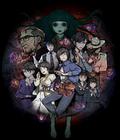Paranormasight: The Seven Mysteries of Honjo is set in Japan's Honjo prefecture in a vague late 70s/early 80s period. It follows a small group of seemingly unconnected individuals. Each of them is given a curse that's connected to one of seven (actually nine) supernatural urban myths that are well known in the regions. The curse, unique to each mystery, gives its bearer the power to horrifyingly kill anyone who meets a specific condition. Why would these curse bearers kill each other? Well, whoever collects enough "soul dregs" from killing people will be given the Rite of Resurrection, the ability to bring any one person back from the dead. The best way to get soul dregs is to kill another curse-bearer. Thus a cold war begins between the supernaturally cursed individuals, and the ultimate prize is on the line.
Probably the single biggest problem with Paranormasight is that it abandons its cool concept relatively quickly. After the action-packed prologue chapters, the curse concept sort of stops. Pretty much every curse user avoids using their curse, and then much of the game is set during daytime, when the curses stop working. While it starts to show up again near the end of the game, it hurts the tone for the central conceit of the experience to all but vanish for a huge chunk of the playtime. It'd be like playing Phoenix Wright, but you don't get any trials after the first chapter.
Paranormasight genuinely needed more teeth and more drama over the using of curses to be effective. It would probably stand out less if the opening chapter weren't a different tone from the rest of the game, with curses flying freely and a genuine tension about out-thinking the other side. There is a pretty fun mystery in the story, but it isn't the story that the game had originally established. The moments when two curse users are trying to talk to one another without triggering their respective opponent's curses are some of the coolest moments in the title.
That said, the core story is engaging. It's relatively short, and that means the plot twists are incredibly quick. The writing is solid enough that most of the characters figure out plot twists about at the same time as the player, and there are relatively few moments of characters acting oblivious. If anything, it's pretty striking how competent everyone in the game is and how effective most of them are at their roles. Things go by so quickly because relatively few characters play dumb.
The gameplay in Paranormasight is what's expected from a visual novel. You veer between engaging in conversation segments and exploring locations in search of items or encounters to advance the plot. There is some light puzzling, but most of that involves figuring out what you need to say in the right situation or how you need to manipulate the cast rather than anything overly complex. You can swap between characters and are expected to do so, as some plot beats won't advance until other characters have moved forward in their plots.
One thing that is neat is that Paranormasight goes extremely hard on the meta elements of the story. You, the player, have an active role in the ongoing events. While none of the characters are aware of it, you can take advantage of gameplay mechanics to alter the story. Occasionally, you can prod characters to change their decisions, and even your options menu or the act of saving the game will play into puzzles. It can make a couple of puzzles difficult to figure out, but it's a neat concept.
That said, this can occasionally lead to frustrating moments when you're trying to puzzle out exactly what weird meta thing you need to do to advance the plot, and the game isn't always great about signposting it. One late-game puzzle effectively tells you, "You know what to do," and if you don't, you're going to spend hours poking through previously explored plot segments trying to locate the trigger. It's easy to imagine someone getting frustrated and giving up, but of course, the helpful internet will probably alleviate this problem.
Visually, Paranormasight is a rather nice game. The character designs are distinctive and expressive, and they do a great job of conveying action despite being still portraits. The backgrounds can occasionally be a little blurry, but it's only noticeable if you're looking for hidden bird stickers in the background. The music is awesome and contains a lot of excellent tunes, including a lot of surprisingly peppy and jazzy songs that almost give the game the feeling of a '80s cop drama.
Overall, Paranormasight: The Seven Mysteries of Honjo is a fun little visual novel that doesn't quite hit all the marks but is still a breezy and enjoyable romp with some creative use of gameplay mechanics. I had a difficult time getting past the fact that it wasn't the game I was had expected based on the first couple of hours, but once I did, I was able to enjoy it for what it was. The setting is clearly built up to potentially allow for more games in the same universe in the future, and I hope the next game in the series is willing to be a bit more daring.
Score: 8.0/10
More articles about Paranormasight: The Seven Mysteries of Honjo













 How far would you go to bring someone back from the dead? Discover the depths that some will go to in this horror-adventure game.
How far would you go to bring someone back from the dead? Discover the depths that some will go to in this horror-adventure game.




